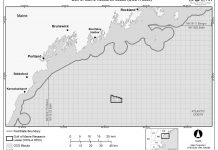U.S. national security and business leaders, including Secretary of Defense Leon Panetta and General Martin Dempsey, Chairman of the Joint Chiefs of Staff, called the Law of the Sea Convention essential to protect American security and economic interests, guarantee the global mobility of U.S. armed forces, and extend U.S. sovereignty.
“Frankly, this is not even a close call – the Law of the Sea Convention is supported by major U.S. industries, the Chamber of Commerce, our energy, shipbuilding, shipping, and communications companies, and environmental organizations, along with past and present Republican and Democratic administrations and the entire national security leadership,” said Secretary Panetta. “Not since we acquired the lands of the American West and Alaska have we had such an opportunity to expand U.S. sovereignty.”
Secretary Panetta and Gen. Dempsey spoke to a gathering of U.S. national security and business leaders in Washington, D.C., convened by The Pew Charitable Trusts and the Atlantic Council. Numerous high-ranking former U.S. military officials and a diverse array of business representatives also participated in the forum to discuss the national security and economic merits of the treaty.
“The U.S. Chamber of Commerce strongly supports the Law of the Sea Treaty because it would provide clear legal rights and protections to American businesses to transit, lay undersea cables, and take advantage of the vast natural resources in and under the oceans off the U.S. coasts and around the world,” said Bruce Josten, executive vice president for Government Affairs at the U.S. Chamber of Commerce.
“The United States stands with Turkey as the only NATO members that have not ratified Law of the Sea, a U.S.-initiated treaty that protects American interests off U.S. shores and around the world,” said Chuck Hagel, a former senator from Nebraska and now chairman of the Atlantic Council. “Senate ratification this year would allow America to take its rightful place and enjoy the benefits and protections of this important treaty.”
The treaty would strengthen America’s claim to the full outer continental shelf. In the case of Alaska, this would extend U.S. sovereignty 600 miles offshore, instead of the current 200-mile limit. For more information visit www.pewtrusts.com.



























